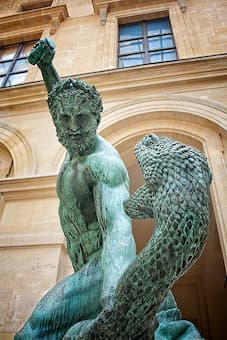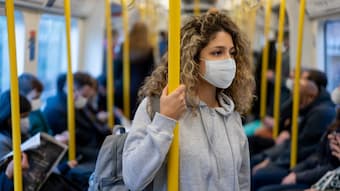How will we end this year? With an Omicron bang or a COVID whimper? A year ago, we expected that by mid-summer, all would be back to normal and life could resume. Now, however, we’re not so sure what normal looks like. The Great Resignation is showing how many people took the time to consider their life style and to find it wanting. It turns out that staying at home can have its own satisfactions. Not commuting can be a positive force in your life!
In looking through the 2 million+ tracks on NML, we found only one work entitled COVID 19. The accordionist Samir Sammy Hasic added this track onto his album No More War, It’s Time for Love.
Hasic Semir: Covid 19
Didn’t hear anything? Perhaps what’s most indicative about it is that it’s a silent track. It’s an interesting comment – in a time of increased noise – get your vaccine, get your booster, the anti-vaxxers, etc. – this artist has chosen silence. Covid is the invisible (and silent) enemy – it’s in the air, it’s on that table – silent but deadly.
Can we use music to construct our review of 2021?

Hercules battles Achelous © Wikipedia
January: We’ll look to Ovid and when Hercules changes into a god. That’s how we all felt: we’d been through the labours of Hercules, and, at the last, like Hercules, something we didn’t take care of earlier came back to haunt us.
After he completed his 12 labours, Hercules went after the nymph Deianeira. When the centaur Nessus tried to interfere, Hercules shot him with a poisoned arrow. As he died, Nessus told Deianeira to preserve his blood – if she rubbed it on Hercules’ garments, he would love only her forever.
Nessus lied.
When she rubbed it on Hercules’ garments, it poisoned him and he died. In the end, he was transported to Olympus to live with the other gods. We didn’t deal with Covid and it continues to haunt us, poisoning our life and sending many off to their own Olympus.
Carl Ditters von Dittersdorf: Hercule changé en Dieu (version for keyboard 4 hands) – III. Tempo di Menuetto – Allegro (James Tibbles and Michael Tsalka, fortepiano)
March: The world focused on the Suez Canal, but for all the wrong reasons. When the Evergrande container ship got caught by the wind and got stuck athwart the canal, the world started to focus on supply chain logistics. When you put a plug in the canal, nothing can go east and nothing can go west: goods, oil, or anything. And so, to the Glory of Egypt! Without the Suez Canal, our lives would be much more limited.
Giuseppe Verdi: Aida (excerpts) – Act II: Gloria all’Egitto ad Iside (Rome Teatro Reale Opera Chorus; Rome Teatro Reale Opera Orchestra; Georg Solti, cond.)

© bbc.com
June: The Mask. The Mask. We’ve all been wearing the mask for months and now for over a year. Our relationship to it has changed from trying to deal with this THING to the new normal. It makes our glasses fog up, our ears hurt, puts a red spot on our nose. On the other hand, we didn’t have a flu season last year (hmmm, maybe masks and handwashing are important), and eventually, going out without a mask felt rather like going out without an essential item of clothing. William Bolcom’s 1990 choral The Mask isn’t about PPE but rather about the mask and hidden identity, using texts by African American poets.
William Bolcom: The Mask – No. 1. We Wear the Mask (University of Texas Chamber Singers; James Morrow, cond.)
July: Hot, Extra Hot, Unseasonably Hot. This summer was where all the little aspects of global warming finally came together: a degree here or there isn’t important, we thought. But when the weather starts to change and normally cool northern climates are feeling like the middle of the desert, the focus changes. Droughts here are matched with floods here. Will we still understand Vivaldi’s Four Seasons when we don’t have seasons?
Paul Lansky: Contemplating Weather – I. Weather Lament (Western Michigan University Chorale; Birds on a Wire; Kimberly Dunn Adams, cond.)
September: Restaurants open…outdoors, people go for exercise…outdoors, let’s take the dog for a walk…outdoors. Inside is no longer the place to be. We want to expand our horizons, see people, even if only from 2 metres away. The elbow hand-shake comes into its own and we are getting far better at reading people’s expressions simply from their eye. Yes! That was a smile!
Aaron Copland: An Outdoor Overture (London Symphony Orchestra; Aaron Copland, cond.)
And then there was Omicron. No more Delta variant, we’ve moved far along the Greek alphabet to letter no. 15. It’s faster! It’s more contagious! It’s less fatal! It’s everywhere! And now we’re about to start the winter months with this new worry.
Brian Ferneyhough: Sonatas for String Quartet – Omicron (Arditti Quartet)
I think we need to close with the Barber Adagio. It’s quiet, it’s beautiful, and will let us get back to a sense of control over what we have. Take care, wear a mask, wash your hands.
Samuel Barber: Adagio for Strings, Op. 11 (New York Philharmonic Orchestra; Leonard Bernstein, cond.)
How would you illustrate the close of 2021, the year we all thought would be better than 2020, which we all thought would be better than 2019?
For more of the best in classical music, sign up to our E-Newsletter






I would play Hall of Ghosts for solo Piccolo by Amanda Harberg or Lament by Jaco Meyer for Solo Flute and Electronics.